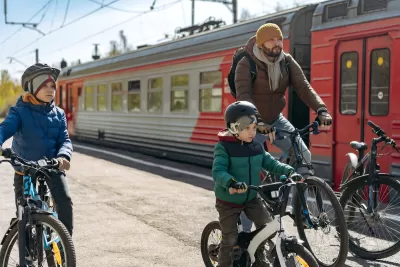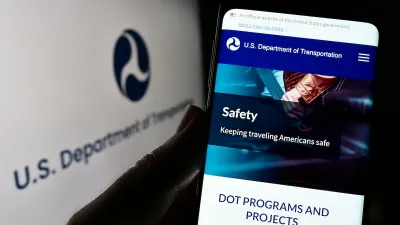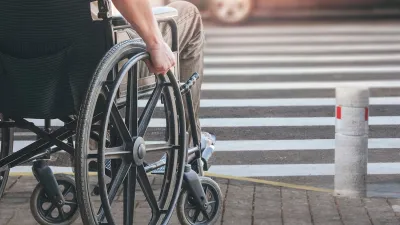Research into accessibility, transit equity, and traffic safety is losing federal funding at an alarming rate.

In a piece for Streetsblog USA, Kea Wilson outlines the sustainable transportation research programs caught in the crosshairs of the Trump administration’s fight against what they term DEI, projects that affect everything from road safety to transit equity and accessibility.
Advocates are still attempting to measure the full scope of the purge, but Nature recently reported that at the National Science Foundation alone — a $10-billion grant-making agency that is among the leading funders of science and engineering research in the country — ‘around 10,000 research grants have been flagged for review’ for possible violations of the executive orders, based in part on searches for broadly-used keywords that frequently arise in papers about the U.S. transportation system.
Nick Ferenchak, director of the US DOT-funded Center for Pedestrian and Bicyclist Safety, emphasized the center’s focus on pedestrian safety and said none of their programs have been affected. While “there might be some revised language in the future, … we should continue [our existing projects] as normal for now.”
Wilson explains why equity efforts matter in transportation policy. For example, “People in wheelchairs have at least a 36 percent higher probability to be killed in traffic collisions than people without disabilities, though federally collected data on disability is already so poor that some experts suspect the ratio is far higher.” Making research on these topics itself dangerous will limit efforts to make roads safer for all users. Now, scientists in a variety of disciplines are in a holding pattern, unsure of the future of their projects.
FULL STORY: Sustainable Transportation Research Is Snagged In Trump’s Anti-‘DEI’ Dragnet

Planetizen Federal Action Tracker
A weekly monitor of how Trump’s orders and actions are impacting planners and planning in America.

Congressman Proposes Bill to Rename DC Metro “Trump Train”
The Make Autorail Great Again Act would withhold federal funding to the system until the Washington Metropolitan Area Transit Authority (WMATA), rebrands as the Washington Metropolitan Authority for Greater Access (WMAGA).

The Simple Legislative Tool Transforming Vacant Downtowns
In California, Michigan and Georgia, an easy win is bringing dollars — and delight — back to city centers.

The States Losing Rural Delivery Rooms at an Alarming Pace
In some states, as few as 9% of rural hospitals still deliver babies. As a result, rising pre-term births, no adequate pre-term care and harrowing close calls are a growing reality.

The Small South Asian Republic Going all in on EVs
Thanks to one simple policy change less than five years ago, 65% of new cars in this Himalayan country are now electric.

DC Backpedals on Bike Lane Protection, Swaps Barriers for Paint
Citing aesthetic concerns, the city is removing the concrete barriers and flexposts that once separated Arizona Avenue cyclists from motor vehicles.
Urban Design for Planners 1: Software Tools
This six-course series explores essential urban design concepts using open source software and equips planners with the tools they need to participate fully in the urban design process.
Planning for Universal Design
Learn the tools for implementing Universal Design in planning regulations.
Smith Gee Studio
City of Charlotte
City of Camden Redevelopment Agency
City of Astoria
Transportation Research & Education Center (TREC) at Portland State University
US High Speed Rail Association
City of Camden Redevelopment Agency
Municipality of Princeton (NJ)





























